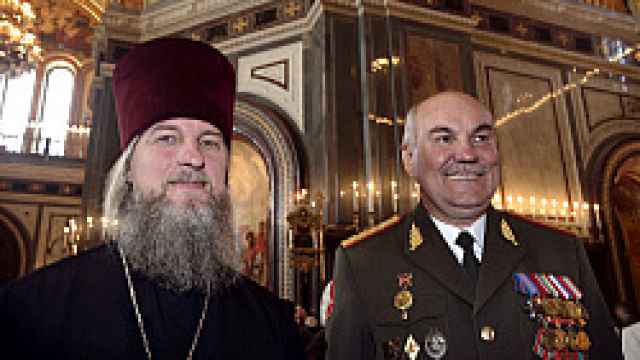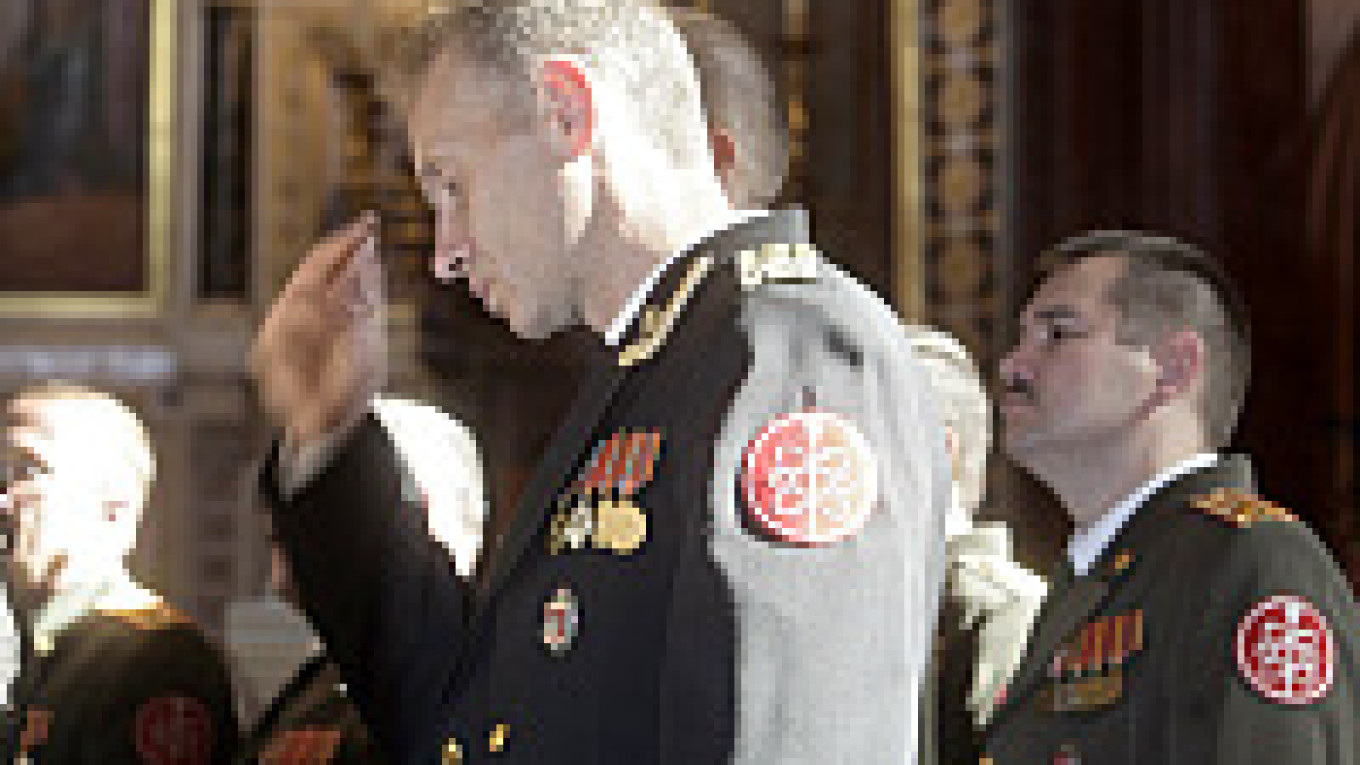In a ceremony at Christ the Savior Cathedral, priests chanted prayers in honor of the Defense Ministry's 12th Main Directorate, which is responsible for the storage and maintenance of the country's nuclear arsenal.
The highly secretive directorate on Tuesday celebrated the 60th anniversary of its establishment by Stalin in 1947, when the Soviet Union was racing to build nuclear weapons after the U.S. atomic bombings of Hiroshima and Nagasaki.
About 200 men and women from the directorate attended Tuesday's ceremony, which would have been unthinkable in the days of official Soviet atheism.
Dressed in uniforms with a stylized atom logo on their sleeves, they occasionally crossed themselves as Bishop Amvrosy of Bronnitsy led the prayer service in the cavernous marble cathedral.
The bishop concluded by reading a congratulatory message from Patriarch Alexy II.
"I congratulate you on this memorable anniversary," he read, "and I raise prayers to God and to the venerable Serafim of Sarov that the nuclear weapons created by you and entrusted to you will always be in God's hands, and will only be weapons of deterrence and retaliation."
Serafim of Sarov is the semi-official patron saint of the directorate.
The patriarch's message was also printed in Tuesday's edition of Krasnaya Zvezda, the Defense Ministry's official newspaper.
Cooperation between the armed forces and the Orthodox Church has been growing in recent years, encouraged by the top military brass and endorsed by President Vladimir Putin.
Some officials support the idea of introducing military chaplains and, although no formal system is in place, Orthodox priests already minister to soldiers in many units on a voluntary, unofficial basis.
More than 2,000 priests conduct services for military personnel, a spokeswoman for the Moscow Patriarchate's military liaison department said.
But while preaching to soldiers on active duty may be a common practice in many armies, including that of the United States and other nuclear-armed nations, blessing the men who run the country's atomic arsenal raises questions that have vexed Christian theologians since 1945.
A spokesman for the Moscow Patriarchate said the church viewed nuclear weapons as a necessary evil.
"In general, the church views any weapons, including nuclear weapons, as evil," Deacon Georgy Roshchin said by telephone Tuesday.
The church has made allowances, however, for contemporary realities, Roshchin said.
 Igor Tabakov / MT General Vladimir Verkhovtsev standing with a clergyman after a service Tuesday in Christ the Savior Cathedral. | |
"The church views nuclear weapons as something of a deterrent factor for the Russian state," he said. "The history of the past 15 years shows that Russia's nuclear capability helped it remain an independent state."
The Roman Catholic Church held a similar position during the Cold War. The Holy See condemned any use of nuclear weapons at the Second Vatican Council in the 1960s, but it acknowledged that they could be possessed in a deterrent capacity.
Since the collapse of the Soviet Union, the Vatican has pushed for disarmament. In 2005, the Vatican's ambassador to the United Nations said the continued possession of nuclear weapons could not be justified in the post-Cold War world.
Deterrence still seems necessary to the Russian military, however.
"These weapons guarantee and will continue to guarantee the peaceful existence of our people, our children and our grandchildren," General Yury Baluyevsky, head of the General Staff, said at Tuesday's ceremony, Itar-Tass reported.
The ceremony was also attended by General Vladimir Verkhovtsev, head of the 12th Main Directorate.
After the end of the service, Verkhovtsev stood near the altar next to Bishop Amvrosy and expressed his wish for the health of Patriarch Alexy II, who has been rumored to be suffering from serious medical problems.
Most officers in the directorate seemed unwilling to talk to reporters after the ceremony.
One uniformed officer, who said his name was Dmitry, said the directorate had been working with the church for years and that priests often gave blessings to different units.
"But this is the first time that [a blessing] has taken place here," said Dmitry, who declined to give his last name.
A name that did often come up during the ceremony because of its importance to the directorate was Serafim of Sarov.
Serafim was a hermit who lived outside Sarov, a town in what is now the Nizhny Novgorod region, in the late 18th and early 19th centuries.
Renowned for spending 1,000 nights in a row praying on a rock with his arms raised to the sky, he became a popular church elder visited by thousands of pilgrims. He died in 1833 and was canonized in 1903, during the rule of Tsar Nicholas II.
In the 1940s, the town of Sarov was renamed Arzamas-16 and became the cradle of the Soviet atomic bomb project, providing the link between the saint and nuclear weapons.
The town, which got its original name back in the 1990s, remains closed to nonmilitary visitors. It now has a functioning church dedicated to Serafim of Sarov.
A Message from The Moscow Times:
Dear readers,
We are facing unprecedented challenges. Russia's Prosecutor General's Office has designated The Moscow Times as an "undesirable" organization, criminalizing our work and putting our staff at risk of prosecution. This follows our earlier unjust labeling as a "foreign agent."
These actions are direct attempts to silence independent journalism in Russia. The authorities claim our work "discredits the decisions of the Russian leadership." We see things differently: we strive to provide accurate, unbiased reporting on Russia.
We, the journalists of The Moscow Times, refuse to be silenced. But to continue our work, we need your help.
Your support, no matter how small, makes a world of difference. If you can, please support us monthly starting from just $2. It's quick to set up, and every contribution makes a significant impact.
By supporting The Moscow Times, you're defending open, independent journalism in the face of repression. Thank you for standing with us.
Remind me later.


